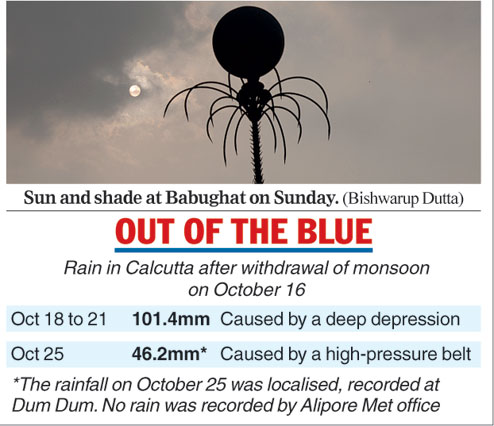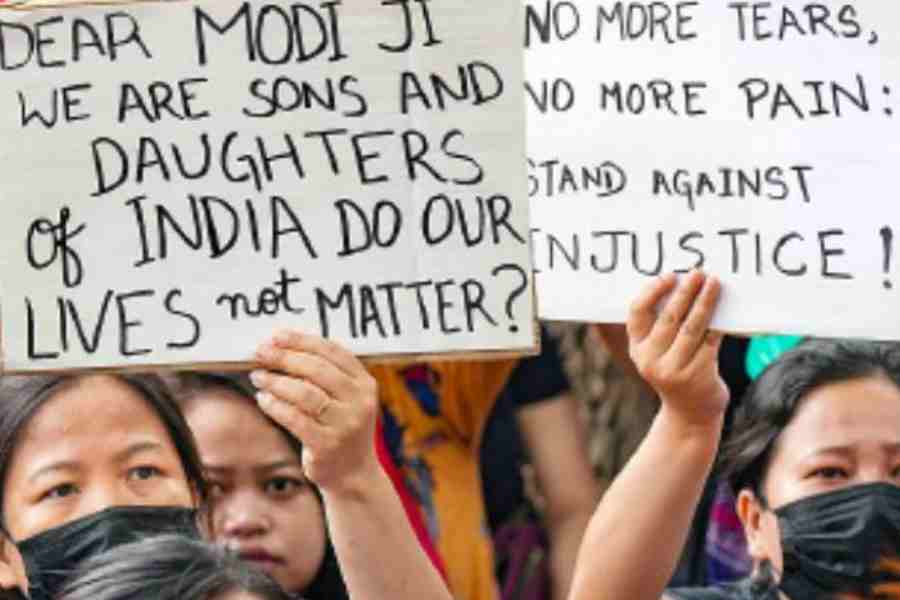
Narada Narada! Mischief is afoot on the Calcutta stage.
Tollywood is either mum or paying a tribute to the powers that be, even as a film called Baghini (Tigress), an act of pure adulation based on the "life" of chief minister Mamata Banerjee, readies for release. But the stage is buzzing with unflattering references to recent activities of the "Ruling Party" of Bengal. Including the after-effects of the Narada sting operation.
Stone Titkiri, a short play that was staged on March 26 at Gyan Manch by the city group Icchemoto, had the audience in splits when a character called Bullet, a member of the Shashak Dal (Ruling Party), explained to a villager the effects of the "sting operation" on the party. It is in deep trouble, and since the leaders are keeping whatever little they get now, not much money is trickling down to the cadre anymore.
Directed by Saurav Palodhi of Icchemoto, a two-year-old city group, the play hits out at the nature of power itself, but in the process takes on the Ruling Party head-on - and a few other institutions too.
Stone Titkiri, which is a play on a Bengali phrase that means taunting, uses a telling allegory. It begins with Bhoga, a poor farmer, out to defecate in the village fields. His posterior touches a stone. It scares him. Stones can be holy.
Life is not good for Bhoga. Among other things, his bicycle has been appropriated for a government programme to give bicycles to the poor. Take from the poor to give the poor. But the bicycle programme may or may not refer to the Trinamul government's Sabuj Sathi programme.
Bhoga runs to people he thinks can advise him, but they scare him even more. The priest tells Bhoga he is guilty of desecrating god, for the stone is a "Shivalinga". The police accuse Bhoga of hiding a bomb. The leader of a party suggests a movement called "Hok Pathar Tola" that wickedly echoes a recent campus movement.
Bullet of the Ruling Party takes over and orders that when the TV cameras start rolling, he is to be informed, for this is a great occasion that his party must use. Bullet is also given to declaring with pride that he will let his "boys" in into the house of any hostile villager: "Chhele puleder ghore dhukiye debo." Who said that exactly? Anubrata Mandal or Tapas Paul?
It turns out that the stone in question is special indeed: it was the foundation stone once laid by a chief minister for a drinking water and toilets project for the village. But the writing on the stone has been smudged by time: it is not clear the honorific appearing before the chief minister is male or female. It is also not clear whether the date was 2010 or 2011, the year Bengal elected Trinamul for itself.
Palodhi agrees that his play is one of the handful of political satires taking on a ruling party since Bratya Basu's Winkle Twinkle, which had erupted on the stage with its sharp comment on the government when the Left was in power. But criticism, especially in the form of laughter, has not gone down well in Bengal, and certainly not under Trinamul rule. Cartoonists have not been killed, but a professor was put behind bars for forwarding a cartoon. Fear has been the key.
But the powers that be fear laughter, as it spares no one. Sometimes the fear can be over-rated, says Palodhi, who works with Zee on its non-fiction programmes, such as Mirakkel, Mir's comedy show, when he is not working for the stage.
Palodhi says though stridently anti-establishment, Stone Titkiri has not faced any great problem so far. And this is not the first time that he has taken on the Ruling Party. In 2014, he directed Buddhijibi, another political satire that had Mir in its cast. It had a character called Didapishi, whose resemblance to the current chief minister was striking.
There's more provocation: in this case, it would not be wrong to brand Palodhi as "CPM", for he is a card-carrying member of the party.
If Icchemoto's plays are new, an old, better-known play has been at it for it for some time too. Fataru, based on the stories of Nabarun Bhattacharya about winged humans from Calcutta who bring in social upheavals by luxuriating in low life somewhat notoriously, is being performed from 2004. In his first stories Bhattacharya had directed his sharp and brilliant satire at the CPM. But in the 12 years that it is being performed, power has changed hands and the play has evolved to talk about not only the CPM, but the Trinamul too.
"The play talks about Arabul (Islam) now," says Debesh Chattopadhyay, its director. The Trinamul leader's name had come up in connection with two murders in 2014.
"Nabarun did not write the Fataru stories as an anti-CPM statement. They were anti-establishment play," says Chattopadhyay.
Narada Narada!










